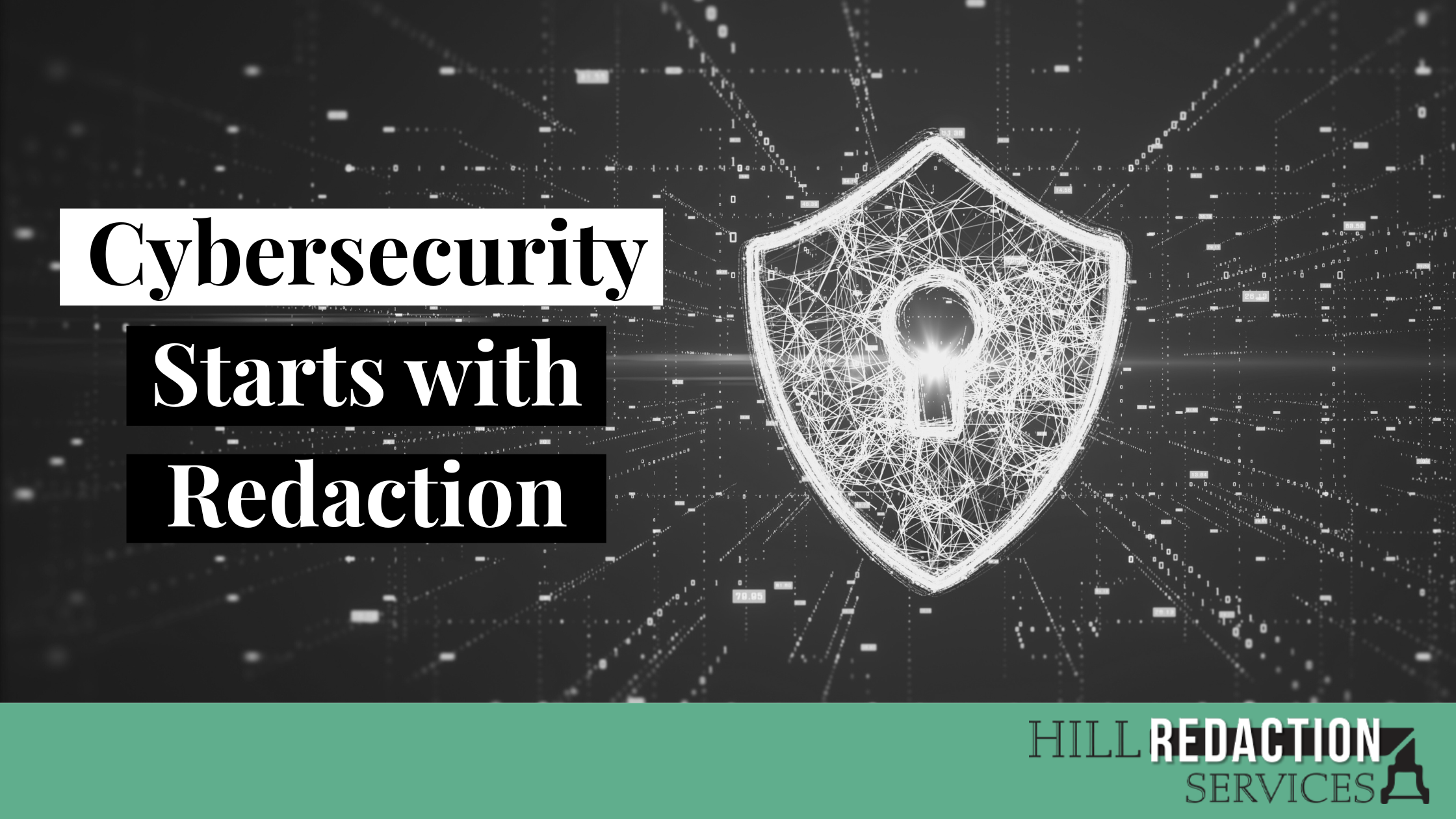
Safeguarding Privacy and Compliance: Why Document Redaction is Essential for the Mortgage Servicing Industry
The mortgage servicing industry handles a high volume of sensitive personal and financial data. From loan applications to foreclosure proceedings, documents contain information that, if exposed, can lead to identity theft, financial fraud, and significant regulatory penalties.
In the mortgage servicing industry, document redaction isn’t just a best practice, it’s a critical necessity for protecting both customers and the business. What is document redaction’s importance in maintaining compliance with regulations like GLBA and GDPR, and mitigating the risks associated with handling sensitive information contained in tax documents, financial statements, and other critical paperwork?
Sensitive Information Mortgage Servicing May Handle:
Mortgage servicers are entrusted with managing loan payments, escrow accounts, and handling communications related to accounts. This also means that mortgage servicers handle documents containing Personally Identifiable Information (PII) and sensitive financial details. Consider the documents a mortgage servicer may handle:
- Loan Applications: Applications contain social security numbers, dates of birth, employment history, bank account information, and credit scores.
- Financial Statements: Bank statements, pay stubs, and tax returns reveal income, spending habits, and overall financial health.
- Credit Reports: These reports detail credit history, account balances, and payment patterns.
- Legal Documents: Documents related to foreclosure proceedings, bankruptcies, and loan modifications contain sensitive details about borrowers’ financial situations and legal proceedings.
- Correspondence: Emails, letters, and other communications may contain sensitive information related to loan status, payment arrangements, and personal circumstances.
Key Compliance Standards in Mortgage Servicing Document Redaction
Document redaction must comply with several regulatory standards. When redacting for the mortgage servicing industry, these are the core compliance standards redactors must keep in mind:
- Gramm-Leach-Bliley Act (GLBA): This US law requires financial institutions to protect the non-public personal information (NPI) of their customers. Redaction is crucial for complying with GLBA by masking sensitive data before sharing documents with third parties.
- General Data Protection Regulation (GDPR): For servicers operating in or serving customers in the EU, GDPR mandates strict data protection standards. Redaction is essential for limiting the processing of personal data and ensuring that only necessary information is disclosed when legally required.
- State Privacy Laws: Many US states have enacted their own privacy laws, such as the California Consumer Privacy Act (CCPA) and the California Privacy Rights Act (CPRA), which grant consumers greater control over their personal information.
Common Scenarios in Redacting Mortgage Servicing Documents
Here are some examples of how document redaction is applied to common documents in the mortgage servicing industry:
- Tax Documents: These documents contain social security numbers, employer identification numbers (EINs), and detailed income information.
- Financial Statements (Bank Statements, Pay Stubs): Redacting account numbers, credit card numbers, and transaction details prevents fraud and protects borrowers’ financial privacy.
- Credit Reports: Redacting full account numbers, dates of birth, and other identifying information minimizes the risk of identity theft and protects private information.
- Legal Documents (Foreclosure Notices, Bankruptcy Filings): Redacting social security numbers, account numbers, and other sensitive details protects borrowers’ privacy and complies with court regulations
The Mammoth Task of Document Redaction for Mortgage Servicing Requires a Firm You Can Trust
Document redaction is a vital part of protecting sensitive information for the mortgage servicing industry. It’s not simply about compliance; it’s about safeguarding customer privacy, mitigating financial risk, and building trust. As data privacy regulations continue to evolve and the threat of data breaches remains persistent, trusting a reputable document redaction firm becomes ever more necessary. Hill Redaction Services are experts and trusted partners for mortgage servicing firms and are known for their thorough, accurate, and on-time document redaction. Call or fill out our form to contact us today.
Related Posts

Safeguarding Privacy and Compliance: Why Document Redaction is Essential for the Mortgage Servicing Industry
The mortgage servicing industry handles a high volume of sensitive personal and financial data. From loan applications to foreclosure proceedings, documents contain information that, if exposed, can lead to identity theft, financial fraud, and significant regulatory penalties.
In the mortgage servicing industry, document redaction isn’t just a best practice, it’s a critical necessity for protecting both customers and the business. What is document redaction’s importance in maintaining compliance with regulations like GLBA and GDPR, and mitigating the risks associated with handling sensitive information contained in tax documents, financial statements, and other critical paperwork?
Sensitive Information Mortgage Servicing May Handle:
Mortgage servicers are entrusted with managing loan payments, escrow accounts, and handling communications related to accounts. This also means that mortgage servicers handle documents containing Personally Identifiable Information (PII) and sensitive financial details. Consider the documents a mortgage servicer may handle:
- Loan Applications: Applications contain social security numbers, dates of birth, employment history, bank account information, and credit scores.
- Financial Statements: Bank statements, pay stubs, and tax returns reveal income, spending habits, and overall financial health.
- Credit Reports: These reports detail credit history, account balances, and payment patterns.
- Legal Documents: Documents related to foreclosure proceedings, bankruptcies, and loan modifications contain sensitive details about borrowers’ financial situations and legal proceedings.
- Correspondence: Emails, letters, and other communications may contain sensitive information related to loan status, payment arrangements, and personal circumstances.
Key Compliance Standards in Mortgage Servicing Document Redaction
Document redaction must comply with several regulatory standards. When redacting for the mortgage servicing industry, these are the core compliance standards redactors must keep in mind:
- Gramm-Leach-Bliley Act (GLBA): This US law requires financial institutions to protect the non-public personal information (NPI) of their customers. Redaction is crucial for complying with GLBA by masking sensitive data before sharing documents with third parties.
- General Data Protection Regulation (GDPR): For servicers operating in or serving customers in the EU, GDPR mandates strict data protection standards. Redaction is essential for limiting the processing of personal data and ensuring that only necessary information is disclosed when legally required.
- State Privacy Laws: Many US states have enacted their own privacy laws, such as the California Consumer Privacy Act (CCPA) and the California Privacy Rights Act (CPRA), which grant consumers greater control over their personal information.
Common Scenarios in Redacting Mortgage Servicing Documents
Here are some examples of how document redaction is applied to common documents in the mortgage servicing industry:
- Tax Documents: These documents contain social security numbers, employer identification numbers (EINs), and detailed income information.
- Financial Statements (Bank Statements, Pay Stubs): Redacting account numbers, credit card numbers, and transaction details prevents fraud and protects borrowers’ financial privacy.
- Credit Reports: Redacting full account numbers, dates of birth, and other identifying information minimizes the risk of identity theft and protects private information.
- Legal Documents (Foreclosure Notices, Bankruptcy Filings): Redacting social security numbers, account numbers, and other sensitive details protects borrowers’ privacy and complies with court regulations
The Mammoth Task of Document Redaction for Mortgage Servicing Requires a Firm You Can Trust
Document redaction is a vital part of protecting sensitive information for the mortgage servicing industry. It’s not simply about compliance; it’s about safeguarding customer privacy, mitigating financial risk, and building trust. As data privacy regulations continue to evolve and the threat of data breaches remains persistent, trusting a reputable document redaction firm becomes ever more necessary. Hill Redaction Services are experts and trusted partners for mortgage servicing firms and are known for their thorough, accurate, and on-time document redaction. Call or fill out our form to contact us today.





